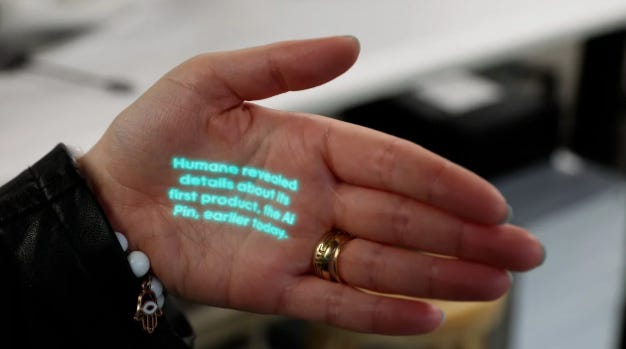Dear Tech Lovers,
Remember that eerie Black Mirror episode, “The Entire History of You”? , where everyone had gadgets that recorded every little moment of their lives? Secrets? Gone. Relationships? A hot mess. Well, guess what? The future's knocking with the latest AI wearable. It feels like that episode sprang to life, and here's the kicker: with AI wearables on the rise, the lines between technology and personal space are blurring.
So, are we ready to jump into this AI-powered adventure? Come with me!
Matt
The Wearable AI Revolution: The Future is More Than in Your Hands
In the dynamic world of technology, a significant shift is underway. As we evolved from desktops to the ubiquitous smartphones, a new frontier is now emerging. Wearable AI is not just reshaping our relationship with tech but is poised to challenge the longstanding reign of smartphones. This evolution is redefining not just the tools we use but how intimately and innovatively we integrate them into our daily lives.
Consider Humane's AI pin, a brainchild of ex-Apple expert Imran Chaudhri. More than just a gadget, promising to project our digital interactions onto almost any surface. No longer are we confined to traditional screens; our very environment could become an interactive canvas.

In a similar vein, the Rewind Pendant offers an elegantly wearable solution for capturing the essence of our days. Beyond merely recording, it seeks to distill our auditory experiences into accessible summaries, potentially changing how we reminisce and reflect.
Similarly, Meta's latest offering, the Ray-Ban smart glasses, is not just about fashion. They're a step towards more intuitive tech interactions, where speaking to an embedded AI chatbot becomes as natural as talking to a friend.
The murmurs of collaboration between design virtuoso Jony Ive and the AI mavens at OpenAI further pique interest. Given Ive's renowned design prowess, this partnership could usher in devices that not only look beautiful but feel indispensable.
And while smartphones aren’t disappearing overnight, the evolution is apparent. Google's Pixel, with its latest Gen AI features, may remain a handheld, but it's clear it’s paving the way for a deeper, more immersive tech experience.
Is the advent of a real-life Jarvis on the horizon? Two significant trends suggest we're moving towards widespread AI accessibility.
Evolution of LLMs: As AI models grow in complexity, the development of large-scale LLMs becomes a domain for resource-rich companies. However, technological advancements indicate a rise in smaller LLMs capable of functioning on wearables and smartphones, delivering comparable performance. This shift may soon allow users to interact seamlessly with AI on devices like smartwatches, marking a pivotal moment in the broad adoption of AI.
Rise of Multimodal AI: These AIs integrate semantics, visuals, and audio. A prime example is Meta's SeamlessM4T, which recognizes 100 languages and supports diverse voice applications. If harnessed within wearables, such AI models could become on-the-go translators and data interpreters, revolutionizing communication across language barriers.
In essence, as these trends continue, we might be on the cusp of an era where AI integrations in daily life resemble the functionalities of the fictional Jarvis, with wearables playing a pivotal role.
🤖How AI is Changing the Way We Work
The integration of artificial intelligence (AI) is reshaping professional landscapes, shopping experiences, and our daily tasks.
🏦 JPMorgan & The Future of Work: Jamie Dimon recognizes AI's potential, highlighting its use in thousands of JPMorgan roles. Despite AI's promise to improve work quality, Dimon warns of potential misuse in wrong hands.
👩💻 Democratizing AI in Coding: Replit integrates the GhostWriter AI tool for all users and introduces an updated open-source language model, replit-code-v1.5-3b, to enhance coding experiences.
🩺 AI Innovations in Healthcare: Google Cloud unveils Vertex AI Search and Med-PaLM 2 at HLTH '23, enhancing operations, patient care, and research in healthcare and life sciences.
🛍️ Amazon's Revolutionary Shopping Experience: Amazon's "Project Nile" aims to transform online shopping by incorporating AI for a more personalized and interactive experience.
💼 Productivity in the Age of AI:
Zoom's "Zoom Docs" integrates AI for content generation and meeting summaries, challenging mainstream office suites.
Arc Browser offers unique AI features like concise tab names and AI-assisted searches for an enhanced browsing experience.
Canva integrates AI tools to simplify design, emphasizing user accessibility and inclusivity.
Adobe's Project Stardust, an advanced AI photo editor, offers capabilities like object removal, background changes, and automatic image layering, rivaling Google's Magic Editor on Android.
LinkedIn amplifies its platforms with OpenAI-backed tools, ensuring a more intuitive approach to professional networking and recruitment.
🌱Notable AI Seed Fundings
PandasAI (conversational AI assistant for data analysis) raised $1.1M from Runa Capital.
Induced AI (AI-native browser RPA platform) raised $2.3 million from Sam Altman, Peak XV, and others.
Humata AI (ChatGPT for PDF) raised $3.5M from Google’s Gradient Ventures, ARK invest, and M13.
Muir AI (AI carbon accounting) raised $3.25M led by Base10 Partners.
Prompt AI (computer vision tool for searchable visual data) raised $5M led by AIX Ventures and Abstract Ventures.
Luda (AI-driven UGC gameplay startup) raised $7M from Bitkraft Ventures and Compound.
Move AI (3D motion capture app) raises $10M from Play Ventures, Warner Music Group, RKKVC, Level2 Ventures, and Animoca Brands.
Revefi (AI cloud data observability tools) raised $10.5M from Mayfield Managing Partner Navin Chaddha.






